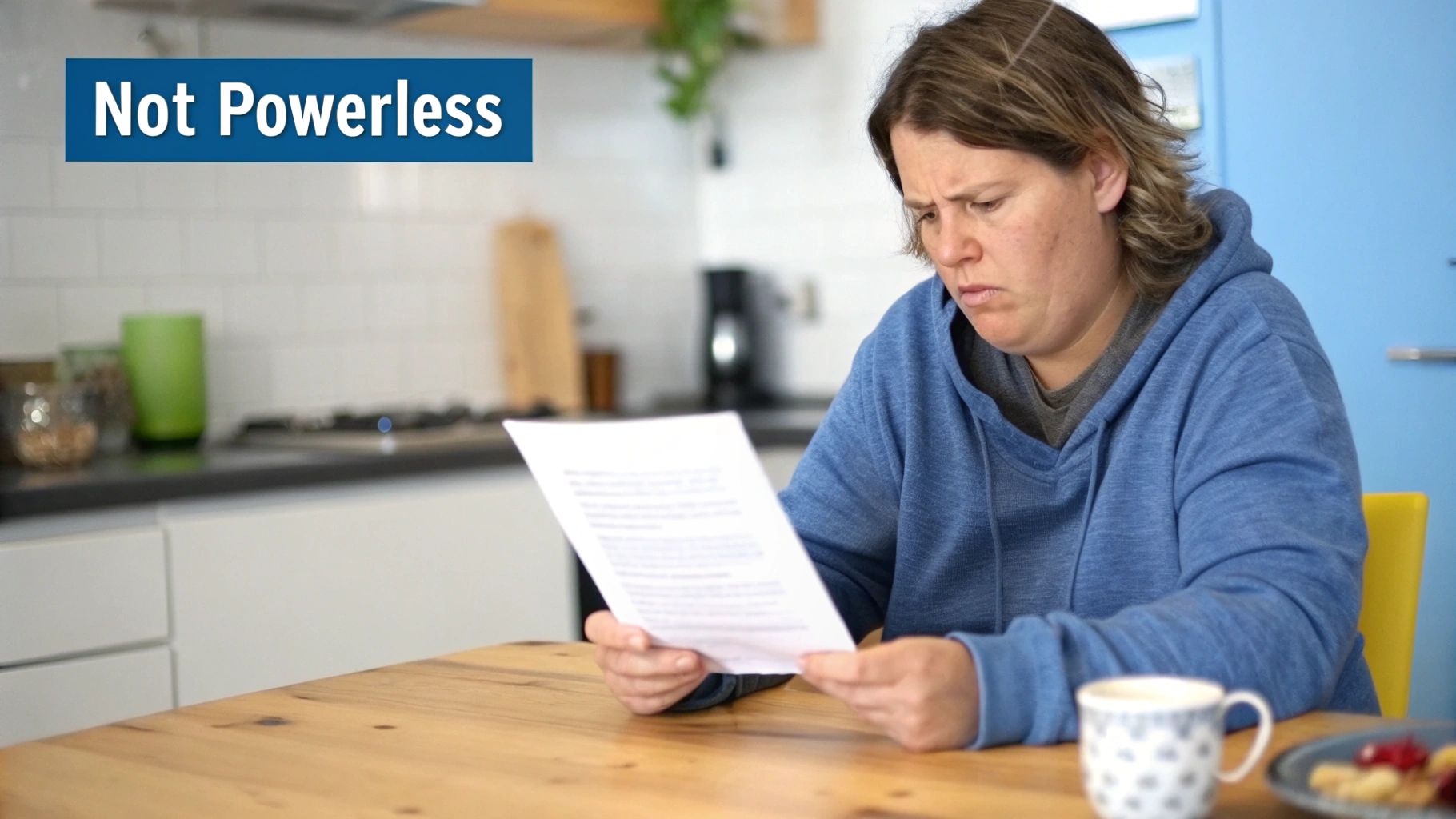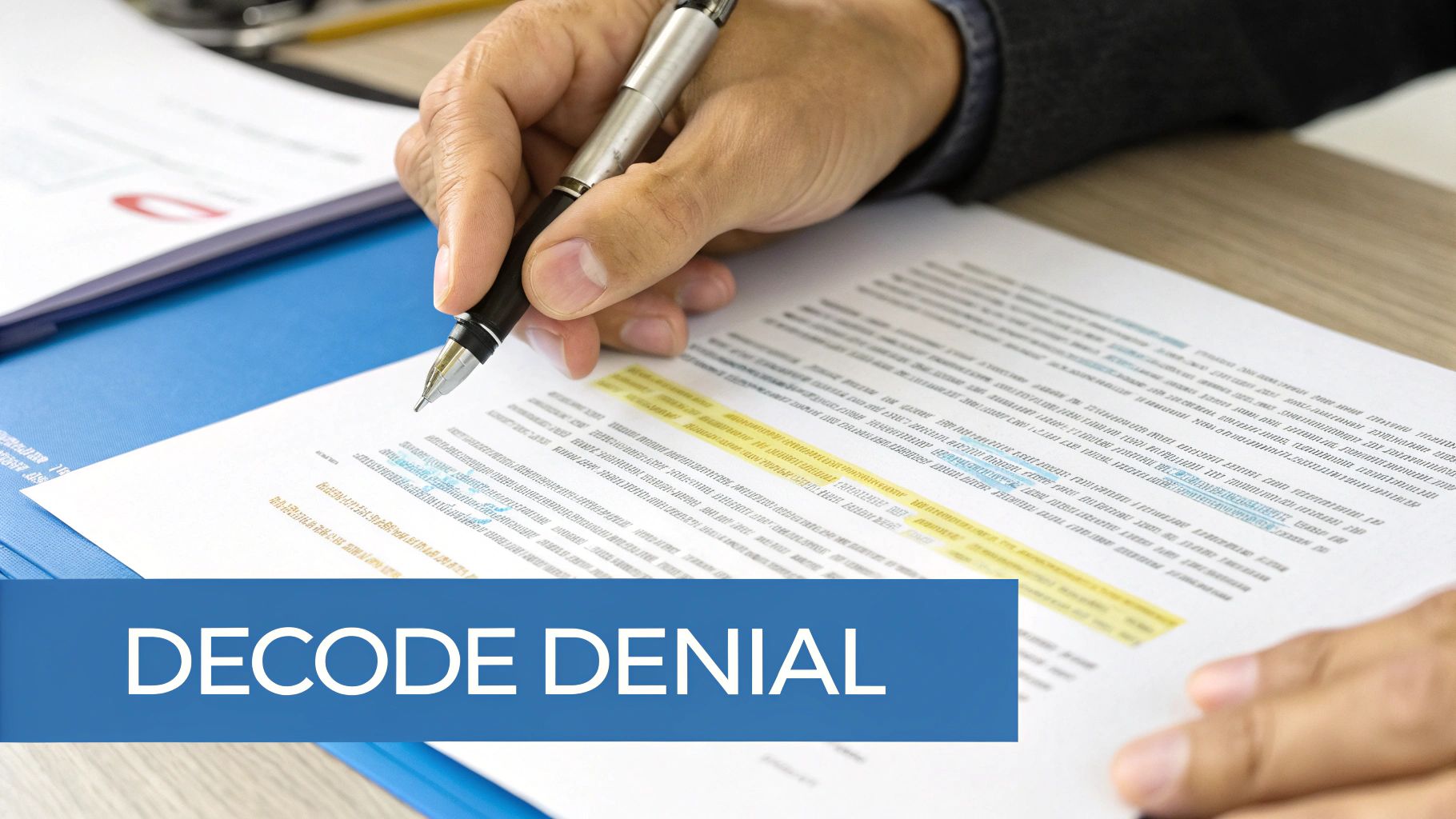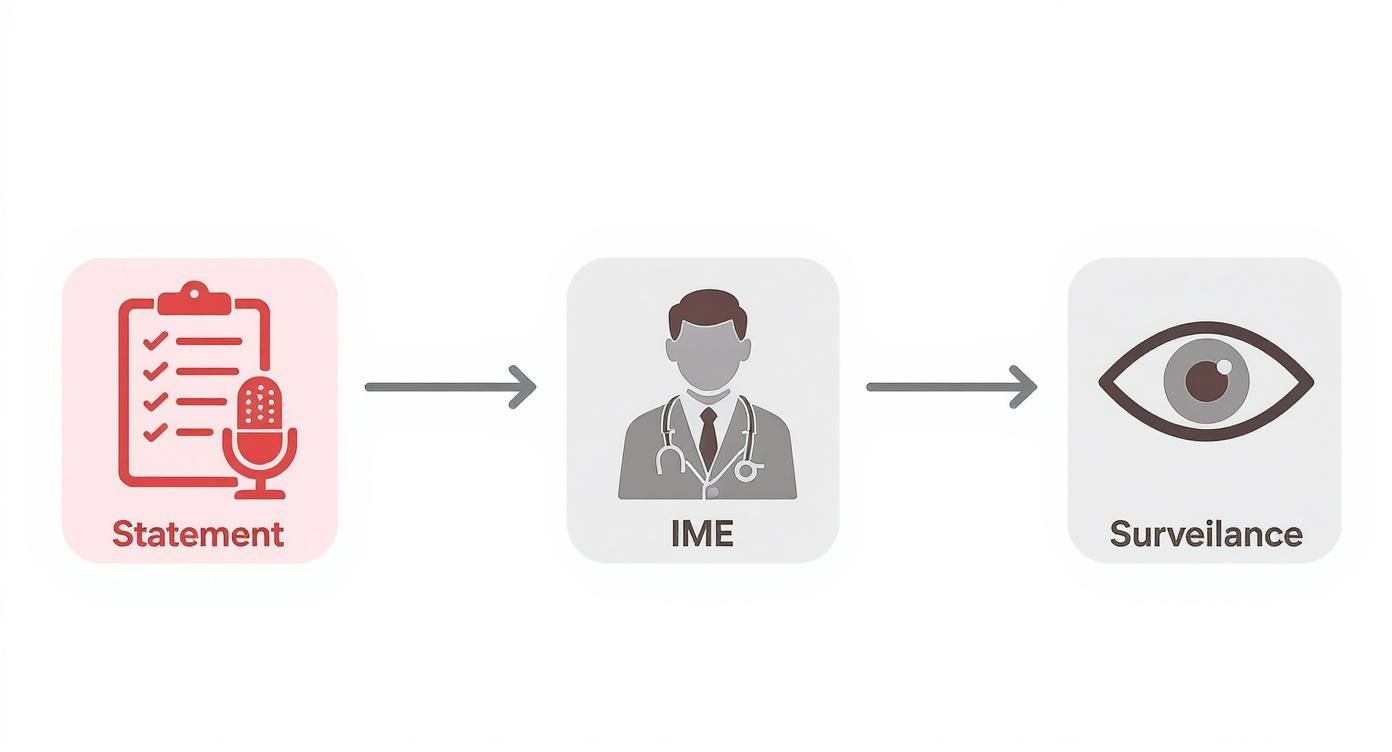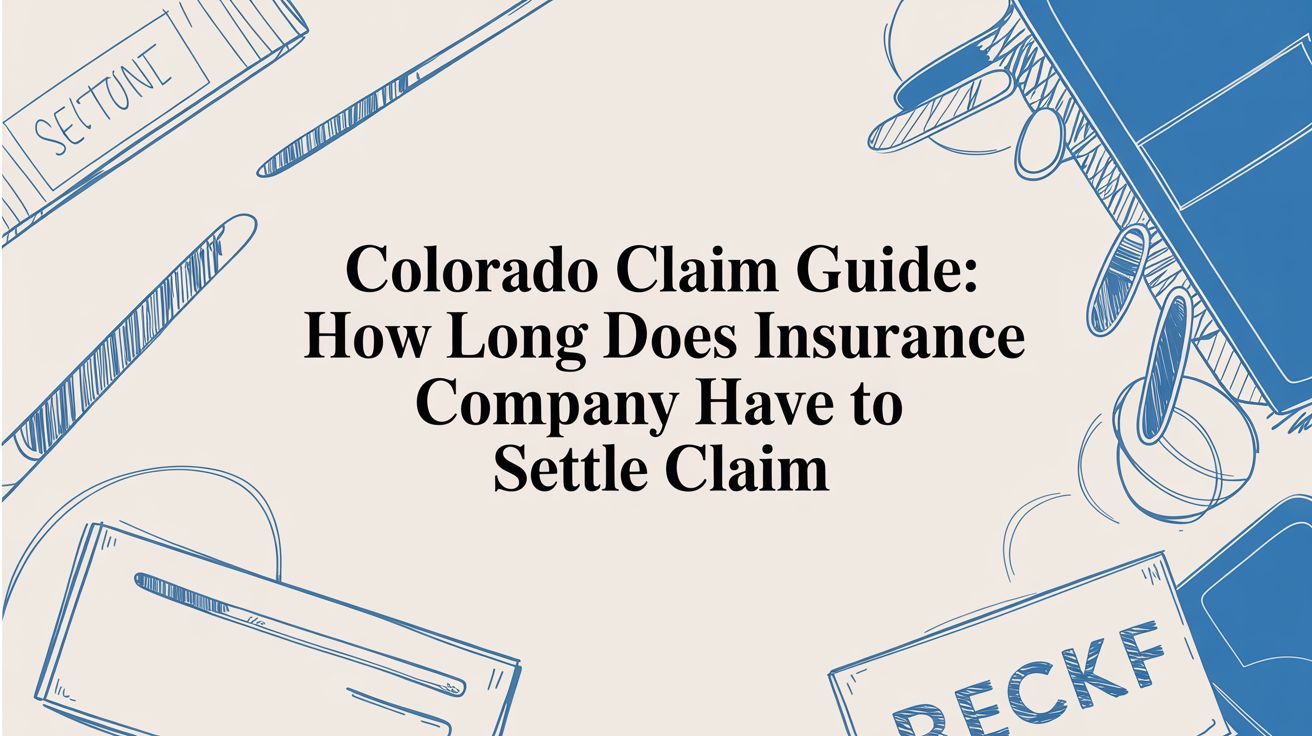Table of Contents
When you get a claim denial letter in the mail after a Denver car accident, it’s easy to feel like it's the final, devastating word—especially when you’re still trying to heal. At Conduit Law, we want you to know the simple truth about why insurance companies deny claims: they are for-profit businesses, and their number one job is to protect their bottom line by paying out as little as possible.
A denial is almost never the end of the road. More often than not, it’s a strategic first move designed to test your resolve. As experienced Denver personal injury lawyers who have recovered over $50 million for our clients, we understand these tactics and know how to fight back.
The Reality Behind Your Claim Denial

After a serious accident in Denver, you rightfully expect your insurance policy to act as a safety net. You’ve paid your premiums on time, every time. Now, when you need help with medical bills and lost wages, you expect support. So when that denial letter shows up, full of dense legal jargon and cold excuses, it can feel like a deep betrayal.
It's critical to understand this isn't personal—it's just business. Insurance companies have entire teams of adjusters and lawyers whose primary function is to pick apart every detail of a claim. They are actively searching for any reason, big or small, to limit what they have to pay. It could be anything from a missed deadline on a form to a dispute over who was really at fault.
Understanding the Insurer's Mindset
Think of the insurance company less as a partner in your recovery and more as a gatekeeper guarding a vault of money. Their goal is to pay out the absolute minimum that the law requires. This profit-first mindset shapes every single thing they do, from the pointed questions they ask in a recorded statement to the lowball settlement offers they slide across the table.
That denial letter? It's often just their opening move in a negotiation you didn't even realize you were in. They're banking on the hope that you'll get frustrated, feel overwhelmed, and simply give up. Recognizing this dynamic is the first, most important step toward fighting back. You are not powerless here.
A claim denial is not the end of the road. It is an invitation to build a stronger case, armed with the right evidence and a clear understanding of your legal rights in Colorado.
This guide is here to pull back the curtain on that process. We’ll break down the common reasons for denials, explain how to push back against them, and give you a clear roadmap for what to do next. It's also helpful to know how insurers put a price tag on a claim in the first place; you can learn more about their valuation methods in our article to see how they crunch the numbers. With the right strategy, you can challenge their decision and fight for the full and fair compensation you deserve.
Translating the Denial Letter's Fine Print

When the envelope from the insurance company finally arrives, the denial letter inside can feel like it’s written in a foreign language. It’s usually dense, packed with legal jargon, policy codes, and justifications that seem designed to confuse and overwhelm you.
Let’s be clear: this isn’t an accident. It’s a strategy. The goal is to make you feel like the decision is final and that you have no recourse.
But underneath all that confusing language, every denial boils down to a specific reason. Your first job is to translate their justification into plain English. Cracking this code is the critical first step in building your counter-argument and is essential to understanding why insurance companies deny claims.
Decoding Common Administrative Denials
A surprising number of claim denials have nothing to do with the facts of your Denver accident. Instead, they’re rooted in simple administrative mistakes or technicalities. While incredibly frustrating, these are often the easiest denials to fix once you pinpoint the problem.
Recent data shows that some of the most common denial reasons are procedural—things like missing information, authorization issues, or incomplete patient data. In fact, inaccurate data provided when you're first admitted is responsible for about 10% of all denials. You can explore more about these claim denial trends to see just how often these slip-ups occur.
These technical denials usually fall into a few buckets:
- Clerical Errors: A misspelled name, a transposed digit in a policy number, or the wrong date of service can be enough to trigger an automatic denial from the insurer's computer system.
- Missed Deadlines: Most insurance policies have strict timelines for filing a claim and submitting your paperwork. If you miss a deadline, even by one day, the insurer will jump on it as a reason for denial.
- Incomplete Information: If you fail to fill out a form completely or don’t provide a requested medical record, it gives the insurer an easy out. They can reject the claim without ever having to look at the merits.
These kinds of denials are maddening because they ignore your injuries and what caused the accident. The good news? They can usually be corrected by providing the right information and formally asking the insurer to take another look.
Unpacking Substantive Denial Reasons
Then there are the more complex denials. These move beyond paperwork issues and take aim at the very core of your claim. They are a clear sign that the insurance company is digging in its heels and preparing for a fight.
Let’s say you were hurt in a T-bone collision at an intersection on Speer Boulevard here in Denver. Your denial letter might cite one of the following reasons, each with a very different meaning behind the corporate-speak.
1. Liability Disputes ("You Were At Fault")
The letter might say, "Our investigation determined that our policyholder had the right-of-way."
- What It Really Means: The insurance company is blaming you. They’re claiming you are either partially or completely responsible for the crash. In Colorado, which is a modified comparative negligence state, if you are found 50% or more at fault, you can't recover a dime. Their goal is to shift the blame entirely onto you to avoid paying anything.
2. Medical Treatment Disputes ("The Treatment Wasn't Necessary")
You might see a line like, "The medical services rendered were not consistent with the injuries reported."
- What It Really Means: The insurer's medical reviewer—someone who has never met you, examined you, or spoken to your doctor—has decided that your treatment was excessive or unrelated to the accident. They'll try to chip away at your claim by questioning your physical therapy, diagnostic scans, or a specific procedure your own physician recommended.
"A common tactic is to approve initial emergency care but deny the follow-up rehabilitative care that is crucial for a full recovery. This saves the insurer money while leaving you with ongoing medical costs." - Elliot Singer, Managing Attorney, Conduit Law
3. Pre-Existing Condition Arguments ("You Were Already Hurt")
A classic phrase is, "The medical records indicate a pre-existing condition that accounts for the claimant's current complaints."
- What It Really Means: The insurer has combed through your medical history and found an old injury or condition, maybe from years ago. They will argue that your current pain is from that old issue, not the recent accident, hoping to dodge responsibility for your new medical bills. This is an especially common play in cases involving back and neck injuries.
Figuring out which of these arguments the insurer is using is crucial. It tells you exactly where the battle lines are drawn and what kind of proof you'll need to fight back. Whether that means getting traffic camera footage from a Denver intersection or a detailed narrative report from your doctor, your response has to directly attack their stated reason for the denial.
Uncovering the Insurer's Investigation Tactics
Behind every denial letter, there’s an investigation. But it's critical to understand that this process is rarely an objective search for the truth. It's a calculated effort to find any piece of information—a stray comment, a doctor's note, a photo—that can be used to justify paying you less or denying your claim outright.
Knowing their playbook is the best way to protect your rights. When you see their requests for what they are, you can navigate your interactions with the insurance company far more cautiously. It’s all about recognizing that this is an adversarial process from the start and preparing for what they’ll throw at you.
The Recorded Statement Trap
Shortly after your accident, an adjuster will likely call and ask for a recorded statement. They’ll make it sound routine, like a simple way to "get your side of the story." In reality, this is one of their most effective weapons for weakening your claim.
The adjuster is a trained professional, skilled at asking leading questions designed to box you in. They might ask something like, "So you were just a little sore after the crash?" or "You didn't see the other car until the last second?" Your answers, given while you're likely still in shock and pain, are then permanently on record. These statements can be twisted later to suggest your injuries weren't serious or that you admitted you were partly at fault.
You are under no legal obligation to provide a recorded statement to the other driver's insurance company. It's always a good idea to speak with a Denver personal injury attorney before you even consider it.
Politely declining until you have legal advice isn't an admission of guilt. It's just smart. It's protecting your claim from being picked apart by someone whose job is to pay you as little as possible.
The So-Called Independent Medical Exam
If your injuries are significant, the insurer might demand you attend an Independent Medical Examination (IME). The name itself is incredibly misleading. These exams are anything but independent.
The insurance company is the one who chooses and pays the doctor who performs the IME. These doctors often have lucrative, long-standing relationships with insurers and are known for writing reports that—surprise, surprise—favor the insurance company's position. They might conclude that your injuries aren't as bad as your own doctor says, that they’re from a pre-existing condition, or that you’ve already healed as much as you’re going to and don't need any more treatment.
This "second opinion" is often all the justification an insurer needs to dispute the cost of your medical care, giving them a clear reason why insurance companies deny claims for ongoing treatment.
Surveillance and Social Media Monitoring
In today's world, an insurer’s investigation goes far beyond statements and medical reports. They actively watch claimants to find anything that contradicts their injury claims. This surveillance usually takes two forms:
- Physical Surveillance: It’s not uncommon for insurers to hire private investigators to follow you. They might park outside your house or film you while you run errands, hoping to catch you doing something—like carrying a bag of groceries or bending over to tie your shoe—that they can use as "proof" your injuries are exaggerated.
- Social Media Monitoring: Adjusters will absolutely scour your public social media profiles. That photo of you smiling at a family barbecue or a simple post about taking a walk can be ripped from its context and presented as evidence that you aren't as injured as you claim to be.
It’s crucial to be mindful of what you do and what you post after an accident. The safest bet is to assume the insurance company is watching, because they often are. Their goal is to build a story that allows them to cut your compensation, and they’ll use every tool they have to do it.
How to Build Your Appeal and Fight Back
Getting a denial letter isn't the end of the road. Think of it as the insurance company making its opening move in a chess match—now it’s your turn to respond with a powerful, evidence-backed appeal. It can feel overwhelming, but breaking it down into a clear plan of action makes all the difference.
Your very first move is to request your entire claim file from the insurance company, and make sure you do it in writing. This file is their playbook. It contains every note, report, and email related to your case, showing you exactly what they used to justify the denial and revealing the weak spots in their argument.
With the file in hand, you can start breaking down the denial letter itself. Don't let the dense legal jargon intimidate you. Your goal is to pinpoint the exact reason they gave for the denial—was it a dispute over who was at fault? A claim about a pre-existing condition? An issue with your medical care? That reason is the target you'll aim for with your counter-evidence.
Methodically Gathering Counter-Evidence
This is where you build the core of your appeal. You need to gather overwhelming proof that directly shoots down the insurer's reason for denial. Simply resending the same old paperwork won't cut it. The goal is to introduce new, compelling information that forces them to see the case in a new light.
This infographic shows some of the common tactics insurers use to build their case against you—the very tactics you now need to counter with your own solid proof.

Knowing their process helps you get a step ahead, allowing you to proactively gather the evidence needed to take their arguments apart piece by piece.
A strong appeal is built on a foundation of credible evidence that tells a clear, consistent story of the accident, your injuries, and the real-world impact on your life.
A detailed checklist can keep you organized as you gather what you need. Think of each document as a building block for your case.
Your Evidence Checklist for a Stronger Appeal
This table outlines the crucial documents and evidence you'll need to build a compelling appeal against a denied personal injury claim in Colorado.
| Evidence Category | Specific Items to Gather | Why It's Important |
|---|---|---|
| Medical Documentation | Narrative medical reports from your treating doctor, second opinions from specialists, all medical bills and records, therapy notes. | This directly links your injuries to the accident, justifies the necessity and cost of your treatment, and refutes claims about pre-existing conditions. |
| Accident-Related Proof | Official police report, photos/videos of the accident scene, vehicle damage estimates, traffic camera footage (if available). | This establishes the facts of the accident, helps prove liability, and contradicts any claims that the accident was minor or that you were at fault. |
| Witness Accounts | Signed and dated statements from anyone who saw the accident, contact information for all witnesses. | Independent, third-party accounts are incredibly powerful for disputing the insurer's version of events, especially when fault is being questioned. |
| Financial Impact | Pay stubs showing lost wages, a letter from your employer confirming time off, receipts for out-of-pocket expenses (prescriptions, travel, etc.). | This documents the full financial toll the injury has taken, proving damages beyond just medical bills and strengthening your claim for compensation. |
Gathering these items systematically creates a powerful, fact-based narrative that is much harder for an insurer to ignore or dispute.
At Conduit Law, we've seen firsthand how a single, compelling piece of evidence—like a detailed narrative from a doctor or a key witness statement—can completely turn a denied claim around. It's about replacing the insurer's biased narrative with undeniable facts.
Adhering to Colorado's Strict Deadlines
In Colorado, the clock starts ticking the moment you receive that denial. Insurance policies have very strict deadlines for filing an internal appeal. If you miss that window—which can be as short as 60 or 90 days—you could lose your right to challenge the decision for good. This is one of the most common and heartbreaking reasons why insurance companies deny claims permanently; they just wait for time to run out.
Comb through your denial letter and policy to find that deadline and circle it on your calendar. Every step you take, from requesting your file to contacting witnesses, must be done with that timeline in mind. Procrastination is the insurance company's best friend.
Building a winning appeal requires time, strategy, and a bit of grit. By demanding your file, dissecting the denial, gathering powerful counter-evidence, and respecting the deadlines, you can effectively push back and force the insurer to reconsider. You're putting the pressure back on them to justify their decision in the face of a well-documented, undeniable case.
Using Colorado Law to Your Advantage
When an insurance company denies your claim, it feels like a massive corporation just slammed the door in your face. But here in Colorado, you aren't powerless. The law provides some serious tools designed to level the playing field, protecting you from unfair treatment and giving you the leverage you need to fight back.
Your biggest ally is the Colorado Unfair Claims Practices Act. Think of it as a rulebook that every insurance company has to follow when handling your case. When they break those rules, it’s not just poor customer service—it’s an act of bad faith.
What Is Insurance Bad Faith in Colorado?
Insurance bad faith isn't just about disagreeing with a claims adjuster's decision. It’s when an insurer acts unreasonably and has no legitimate basis for denying or delaying your benefits. Put simply, they know (or should have known) your claim was valid but still refused to pay.
Some of the most common examples of bad faith include:
- Failing to conduct a reasonable investigation into your accident before making a decision.
- Misrepresenting the facts or your policy provisions to trick you into thinking you aren't covered.
- Refusing to pay a valid claim without a good reason, hoping you’ll just get frustrated and give up.
- Unreasonably delaying payments or going silent when you're trying to get answers about a covered claim.
Knowing these rules is crucial, especially since every driver has to meet certain coverage standards to begin with. You can refresh your memory on the state minimums and other options in our guide to Colorado auto insurance requirements.
In a bad faith case, the focus shifts from the details of your accident to the behavior of the insurance company. The main question becomes: Did the insurer treat you fairly and honestly?
The Power of Holding Insurers Accountable
This is where things get really interesting. Proving an insurer acted in bad faith is a huge deal for your case. Under Colorado law, if you can show an insurer unreasonably denied or delayed your claim, you may be entitled to recover double the amount of the covered benefit, plus your attorney fees and court costs.
This provision is a total game-changer. It puts real teeth into the law, forcing insurers to think twice before issuing a flimsy denial because the penalty for getting caught is severe.
Let’s say your medical bills and lost wages from a Denver car accident come out to $75,000, and your insurance company denies the claim without a solid reason. By proving they acted in bad faith, you could potentially recover not just the original $75,000, but an additional $150,000 in damages, on top of attorney fees. This law transforms your fight from a simple contract dispute into a powerful tool for justice.
Knowing When to Hire a Denver Injury Attorney
Sometimes, you can fix a minor administrative mix-up with a simple phone call. But when you get a formal claim denial in the mail, that’s a different story. It’s a clear signal that the insurance company is digging in its heels, ready for a fight.
Going up against an insurer by yourself after a denial is like stepping into the ring against a professional boxer. They have a whole team of experts in their corner, and you’re left at a serious disadvantage from the opening bell.
Certain situations are immediate red flags. When you see one, it’s no longer a question of if you should call an attorney—it’s about protecting your rights before the insurance company causes any more damage.
Clear Triggers for Legal Action
- Denials Involving Serious Injuries: This is simple math for the insurer. The more your claim is worth, the harder they’ll fight to avoid paying it. If you’re facing significant medical bills, need long-term care, or are dealing with a permanent impairment, you need a professional to level the playing field.
- Complex Liability Disputes: Is the insurance company trying to pin the blame on you? Are they twisting the facts of the accident? If so, you’re not just in a claims dispute anymore—you’re in a legal battle. An experienced attorney knows how to gather the right evidence, bring in accident reconstruction experts, and build an airtight case that proves who was really at fault.
- Any Hint of Bad Faith: When an insurer starts using endless delay tactics, misrepresents the plain language of your policy, or denies your claim without a real, logical reason, they may be crossing a legal line. This is known as acting in bad faith. You can learn more about what this means for Colorado victims in our detailed guide on insurance bad faith claims.
Bringing in an experienced personal injury attorney immediately changes the entire dynamic. At Conduit Law, we step in and take over all communication, shielding you from the adjuster’s pressure tactics. We then use our legal expertise to build a powerful appeal backed by hard evidence they can't ignore.
Hiring an attorney sends a clear message to the insurance company: you will not be intimidated, and you are prepared to file a lawsuit if they refuse to be fair.
This one move allows you to step away from the stress and noise of the fight. You can finally focus completely on what actually matters—your physical and emotional recovery. We’ll handle the legal headaches while you concentrate on healing.
Your Questions About Claim Denials, Answered
When that denial letter hits your mailbox, a flood of questions usually follows. It’s stressful, and the jargon insurance companies use doesn't help. Let’s cut through the noise and tackle some of the most common questions we hear from people in your exact situation.
How Long Do I Have to Appeal a Denied Claim in Colorado?
This is a tricky one, and the clock is always ticking. While Colorado law gives you two or three years from the date of an accident to file a lawsuit (this is called the statute of limitations), your insurance policy has its own set of much, much shorter deadlines for filing an internal appeal.
Missing an appeal deadline can permanently slam the door on your right to get paid. It's one of the first things an attorney will check in your policy, because acting fast is absolutely critical.
What Is an Insurance Bad Faith Claim?
Think of it this way: you held up your end of the bargain by paying your premiums. An insurance bad faith claim is a separate lawsuit you can file when your insurer doesn't hold up its end, denying or delaying your claim without a good reason.
Under Colorado law, this is a powerful tool. If you can prove the insurance company acted unreasonably, you can sue for your original benefits plus significant extra damages—potentially up to double the covered benefit, plus all your attorney fees. It’s how the law holds insurers accountable for unfair games.
Can My Insurer Cancel My Policy If I Appeal?
Absolutely not. It is illegal for an insurance company to retaliate against you just for using your policy. Filing a claim or appealing a denial is you exercising a right that you pay for every month.
If an insurer even hints at canceling your policy or jacking up your rates because you’re fighting a denial, that’s a massive red flag. It’s a bullying tactic that could be another example of bad faith, and you should talk to a lawyer immediately to protect yourself.
Do I Have to Pay a Lawyer Upfront to Fight a Denial?
No, you don't. Reputable personal injury firms like Conduit Law work on a contingency fee basis.
It’s simple: you don’t pay us a dime upfront. We only get paid if we win your case by securing a settlement or a court verdict. This approach levels the playing field, removing the financial risk so you can get top-tier legal help no matter what your bank account looks like. It guarantees that everyone gets a fair shot.
This blog post is for informational purposes only and does not constitute legal advice. Every personal injury case is unique, and past results do not guarantee future outcomes. Contact Conduit Law for a free consultation.
Let Conduit Law handle the legal complexities while you focus on recovery. Contact us today at (720) 432-7032 or fill out our online form to get a free, no-obligation case evaluation from Denver's experienced personal injury attorneys. Learn more at https://conduit.law.
Written by
Conduit Law
Personal injury attorney at Conduit Law, dedicated to helping Colorado accident victims get the compensation they deserve.
Learn more about our team



